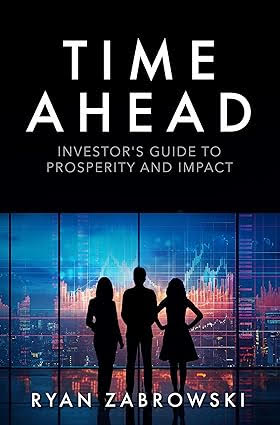 Ryan Zabrowski
Ryan Zabrowski
Time Ahead
Time is a critical component and often the most important factor in every decision made in life, capitalism and investing. As we grow older and hopefully wiser, we learn that time is not some intangible construct but rather life’s most precious asset. The wealthiest cannot buy it and we all run out of it. Time is the greatest gift you can give to someone…unless they are poor, in which case it’s money.
Time Ahead refers to two of the most important facets of capitalism. It is having a lead or advantage, as well as looking into the future. The same two words symbolize two different concepts, each of which is a vital element of succeeding in capitalism.
The investor or business that starts with a lead has a tremendous competitive advantage. The ability to look into the future and recognize the opportunities and threats helps sustain that competitive advantage.
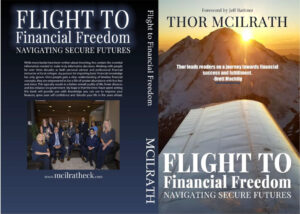
Thor Mcilrath
Flight to Financial Freedom: Navigating Secure Futures
“Thor McIlrath artfully weaves together his experiences as a pilot and a financial planner—two domains where it’s equally crucial to both set a plan upfront, and be prepared for mid-course corrections along the way-to guide readers through setting their own retirement plan.”
Michael Kitces: MSFS, MTAX, CFP, CLU, ChFC, RHU, REBC, CASL, Head of Planning Strategy for Buckingham Wealth Partners & Host of Financial Advisor Success Podcast.
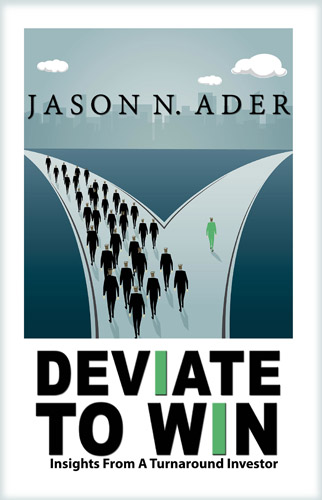
Jason Ader
Deviate To Win
Jason Ader is a global turnaround investor and the CEO of SpringOwl Asset Management LLC, a New York–based investment management firm. Prior to that, he was a senior managing director at Bear, Stearns & Co., where he was ranked by Institutional Investor as the top analyst in the lodging and gaming sectors for nine consecutive years.
Jason’s history of successful turnaround investments spans a variety of industries and includes Las Vegas Sands Corp., Bwin Interactive Entertainment, The Stars Group Inc., International Game Technology, Papa John’s Pizza, First Bank of Nevada, Adelie Foods Group and others.
With the good fortune to be mentored by financial industry visionaries Ron Baron and Alan Greenberg, Jason learned to think outside the box and challenge conventional wisdom early in his career.
In his book, Jason explains his unconventional analysis that uncovers underperforming companies with underlying value, and the solutions that helped return them to profitability and restore shareholder value.

James M Russo
Invest Like An Aardvark
It’s impossible to manage a portfolio without occasionally making mistakes. Learning from those mistakes is what helps keep me humble. As a pilot, overconfidence can lead you to take risks with the airplane that you shouldn’t. Young pilots are especially susceptible, believing they are bulletproof. I’ve lost a lot of friends who flew airplanes.
Overconfidence can kill, whether it’s flying an airplane or managing a portfolio. Humility teaches you the importance of not having to swing at every pitch, living to fight another day, and thinking about where you might be wrong. Humility helps you avoid overconfidence that can blow up your portfolio. It’s in short supply on Wall Street, which is populated with overconfident young Ivy League graduates who think they’re smarter than the market. They have the idea that they are going to become the next wealthy Wall Street titan. They lack humility and can’t imagine being wrong about their ideas. They make horrible mistakes, such as using leverage with huge concentrated positions, and they blow themselves — and their clients — up.

Stewart Flaherty
Dream Plan Live
In this comprehensive but easily understood book, Flaherty explains that regardless of how carefully you plan your future, its’ a certainty that it won’t unfold exactly as you expected. That is why he advocates planning not only for what you hope to attain but also for what you don’t anticipate. His firm’s trademark Lifestyle Financial Managment process helps clients identify and commit to the fundamental principles that enable sound financial decisions. The key is to find a livable balance between enjoying the moment and saving for the future. It can be challenging but Flaherty offers a step – stop process for both living today and protecting tomorrow. Actual client studies demonstrate how that process has worked over the last 50 years, including through the disruptions of the COVID pandemic. Stew Flaherty is the Founder and CEO of FlahertyColvin, an independent financial consulting firm serving clients nationwide from its base in Westerville, Ohio. His career as a financial advisor is founded on reality-tested core principles that facilitate a sensible, sustainable approach to successfully managing money.

Stew Flaherty
Lifetime Lessons
Having a coach or advisor who has gone through difficult times, overcome obstacles and helped others achieve their goals is invaluable. When I began my journey with the fledgling U.S. women’s bobsled team, I employed the concept of principles over products. At the start, we had nothing: no sleds, no coaches, no uniforms, no money and virtually no support. I had some background in raising money but I knew nothing about bobsledding. What we did have were some dedicated girls and some willing volunteers.
It’s hard to describe the euphoria we all felt when our women stood on the podium at the 2002 Olympics and claimed the gold medal for the United States. It had been six years of sacrifice, dedication and overcoming seemingly insurmountable obstacles that allowed this group of incredibly resilient young women to the claim the ultimate amateur athletic prize of an Olympic gold medal. Standing there in Salt Lake City, watching the expressions on the faces of those women as our national anthem played was one of the high points of my life. This group of women who came from nowhere, fought through unbelievable adversity, refused to be denied an opportunity for greatness, then seized that opportunity to become one of the great “rags to riches” stories in the history of the Olympics.

Robert Krakower
The American Dream, Unrealized
As a nation, America faces the possibility of declining like the Roman Empire in its latter days, where citizens became richer, lazier and unhappier than ever. Who will lift the country out of its apathetic malaise? Certainly not our political leaders, who have forgotten how to lead. Today’s politicians, like most of those who came before them, simply kick the can down the road when it comes to finding solutions. Every recent generation has done the same so the problems perpetuate indefinitely and grow worse. And it’s sad because today we have the resources and education to know what to do and all the reasons to succeed. What we lack is the wisdom and vigor to do it.
The lethargy that plagues today’s society produces a dangerous collective mindset: the belief that problems will somehow work themselves out if we wait long enough. This misconception is an especially hazardous conviction for investors approaching retirement.
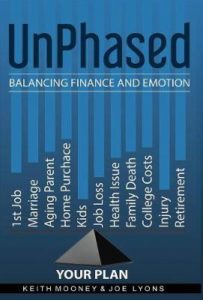
Keith Mooney, Joseph Lyons
Unphased: Balancing Finance and Emotion
We were watching an NBA championship game. One of the players was making shot after shot, most of which were from 25 or 30 feet away. He was “in the zone” and it seemed like he didn’t even have to aim; he just tossed the ball up and in it went. He could hardly wait to get his hands on the ball and hoist up another swish. He obviously felt he couldn’t miss. Interestingly, during his previous game, that same player missed 15 consecutive shots, experiencing one of his worst-ever shooting nights.
Sometimes, the markets are like that. Since sinking to the depths in 2009, the DJIA has had a remarkable rebound, tripling in value through the end of 2016. The happy result is that virtually anyone who remained invested has been “in the zone” for the past decade. Advisors and investment managers are once again gleefully touting their performance. The market has been on such a roll, even do-it-yourself investors have temporarily overcome their inherent tendencies to self-destruct.

Eric Muir
Retirement: Stop Worrying, Start Planning
Investors who act on information they glean from the media believe they are getting accurate, timely information. If they didn’t, they wouldn’t pay any attention. The media knows they must purport to be delivering credible information and so they parade an endless procession of analysts, economists, fund managers and other “experts” who are given name recognition and exposure in exchange for providing “inside” information. The real dope is the investor who listens and acts on the speculation without questioning the motives of the person offering the advice.
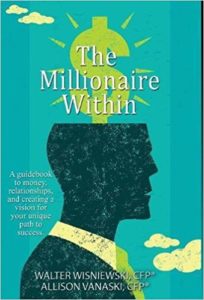
Walter Wisniewski, Allison Vanaski
The Millionaire Within
The bottom line is that you don’t need any more tips or ideas about how to choose investments. If instead you pay attention to what is important in your life and finding personal fulfillment, the rest of your concerns will take care of themselves. It isn’t getting the highest return on your investments that will bring you to your “Aha!” moment; it’s pursuing and fulfilling your dreams. Further, the adversities you encounter along the way contain the seeds for new and better things to come. Your biggest financial failures will present you with opportunities for future financial success. Cherish them!
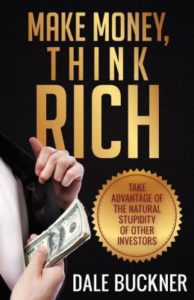
Dale Buckner
Make Money, Think Rich
Many animal studies shed light on how ancient man was able to recognize troop mates almost instantly. They were programmed to feel more comfortable among their troop mates and family. Further, they felt safer when surrounded by familiar locations and landmarks.
Modern man has, for lack of better word, a prejudice for the familiar. This prejudgment often creates the mistaken view that the company where we work is safer than other companies. No knowledgeable investment advisor would advise investors to put all of their nest egg into a single stock, but that is exactly what many a 401k, ESOP or Employee Stock Option Plan participant does. Advisors who condone such an investment strategy could be sued for malpractice if the stock should lose money due to a companywide collapse.
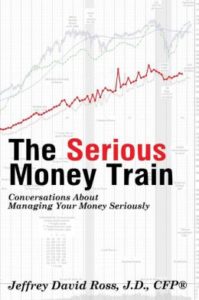
Jeffrey David Ross
The Serious Money Train
Simply put, the reason to invest in the great businesses of the world is because the path of human progress is upwardly-sloping, making the world always more valuable, and the value is primarily created by businesses, which themselves increase in price as they become more valuable. The trick is to recognize this principle during the times when our collective pessimism makes it appear that the businesses of the stock market are becoming less valuable.
While it’s true every investor is trying to make more money, some are trying to make more money that day, some over the short-term, some over the long-term and some over the very long-term. Some investors hope to make money by having prices drop while most hope to make money from a rising market. Investors bring their own circumstances, timing and opinions to the market. Waiting for a fix to a particular problem before beginning or resuming an investment just doesn’t make sense, given the complexity of the system you are trying to out-guess.
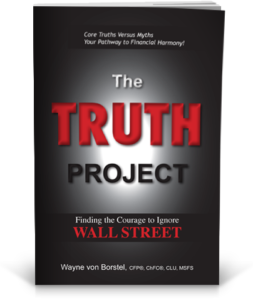
Wayne von Borstel
The Truth Project
Children tend to emulate the spending habits of their parents. If you are a moneyholic, chances are your children will be afflicted with the same addiction. Children who are taught the value of money at an early age have a better chance of becoming self sufficient, responsible adults. They are also far less likely to take up residence on their retired parent’s couch as middle-aged laggards.
Too many young people are not given the opportunity by their parents to suffer financially. They grow up thinking money is for spending, and that’s what they do.
If as your advisor I asked you to convince your 25-year-old son or daughter to borrow $30,000 and put the entire amount into the stock market, you would say I was crazy and probably fire me. Yet the average American thinks it’s perfectly fine for their child to borrow $30,000 and buy a deprecating asset that will be worthless in 10 years if it doesn’t kill them first. If I could convince young people to forego just one car purchase in their twenties, it would completely change their life.
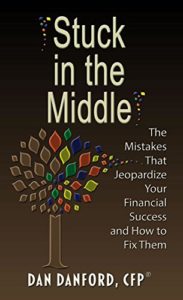
Dan Danford
Stuck in the Middle
I reject the notion that personal finance has to be boring. In fact, one reason many people fail is because they envision it as boring, and it very likely has been drudgery most of their lives. So the remedy to the boredom challenge is to add some spice in accomplishing goals.
No disrespect for the boring stuff, which has been well documented when it comes to personal finance. Every bookstore and library is crammed with “how to” financial books. Countless internet sites offer advice. Much of it relevant and helpful but knowing something isn’t the same as doing it. That’s where most people come up short.

